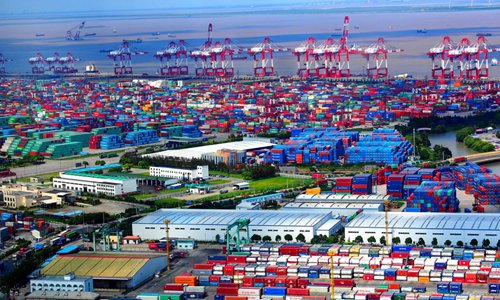China Customs said on Wednesday that it will further improve the high-quality development of comprehensive bonded areas, an important platform for China’s opening-up, to better serve the “dual circulation” strategy.
The agency released 23 measures that aim to reform the business operation structure and optimize whole-process supervision.
Many of the measures are related to promoting the development of new bonded businesses. For example, promoting the dynamic adjustment of the bonded maintenance catalog, and including more high-tech, high value-added and low-risk products that meet environmental protection requirements in the bonded maintenance product catalog.
Another example is to support the training business of aviation flight simulators and large-scale medical equipment in comprehensive bonded areas. In addition, goods from duty-free shops are allowed to be imported through the comprehensive bonded areas, which will broaden sales channels.
Other measures include accelerating the establishment of a policy environment and business environment suitable for the development of services such as high-end manufacturing and research and development maintenance to further reduce institutional transaction costs.
The successive implementation of the reforms will inject strong new momentum into the development of special areas such as comprehensive bonded areas, and promote them to a new level, Chen Zhenchong, an official from the General Administration of Customs, told a press conference on Wednesday.
Special customs areas in China came into being with reform and opening-up. After more than 30 years of development, the special customs areas have become an important platform for China’s opening-up.
China has six types of special commercial areas, including bonded areas, export processing areas, bonded logistics areas and comprehensive bonded zones, which can enjoy favorable taxation policies and are managed by customs authorities.
There are 167 special areas in the country, of which 156 are comprehensive bonded areas, accounting for 93.4 percent, located in 31 provinces and municipalities.
Data from the customs showed that in 2022, the import and export value of the special areas was 8.4 trillion yuan ($1.15 trillion), a year-on-year increase of 7.4 percent, accounting for 19.9 percent of the country’s total foreign trade.
“Dual circulation,” the new development pattern that China adopted in 2020, takes the domestic market as the mainstay while allowing domestic and foreign markets to reinforce each other.
(Global Times)




